After a successful trial, U.S. wholesale electricity provider American PowerNet (APN) has hinted at multiple potential future projects in energy trading with Australian blockchain firm Power Ledger. This was Power Ledger’s first peer-to-peer (P2P) energy trading arrangement in the U.S., otherwise deployed in multiple countries, including France, Japan, and India.
In September this year, the Federal Energy Regulatory Commission issued Order 2222. The Order enables distributed energy resources (DERs) to ‘participate alongside traditional resources in the regional organized wholesale markets,’ thereby removing barriers, opening the market to competition, and new resources, encouraging business and technological innovation into the energy market.
The trial used Power Ledger’s blockchain-based xGrid platform, through which APN traded solar power generated from its headquarters’ rooftop with two other commercial participants. Power Ledger used existing APN hardware such as distribution systems and solar assets from meter data. For the trial, the platform was deployed into the PJM Interconnection, the largest wholesale electricity market in the U.S., which powers around 65 million people. It resulted in 43MWh traded energy and allowed the participants to buy solar energy at 5% lower rates.
The two participants entered into a two-year commercial deal to continue using xGrid. That project is expected to result in 350MWh traded energy and 75 MWh of traded renewable energy. APN and Power Ledger also envision a P2P electricity trading platform whereby consumers can trade rooftop generated electricity to retail brands for vouchers.
APN CEO Scott Helm confirmed APN is seeking to extend Power Ledger’s technology across its market. “This trial has demonstrated the value proposition of blockchain technology and we believe there will be significant interest from market participants.”
Co-Founder and Executive Chairman of Power Ledger, Dr. Jemma acknowledges the significance of the American trial. “Our technology is proving to be compatible with existing large-scale electricity infrastructure like the PJM in the U.S. and the National Electricity Network in Australia. This places Power Ledger in a powerful position in the market as a network-ready technology.”
Power Ledger has experimented in various projects back on home soil. A recent project involved a collaboration with estate developer OP Properties to create one of Australia’s first carbon-neutral apartment developments. The five-story apartment building called Montreal Commons will use ‘developer-funded’ rooftop solar panels and local battery storage, which can be topped up through green energy provided by electricity retailer Change Energy.
An expert in energy trading, Power Ledger also has a three-year deal with property developer Nicheliving to install its energy trading platform at ten residential projects in Perth. The ultimate goal is to introduce large-scale solar energy trading in Western Australia.






